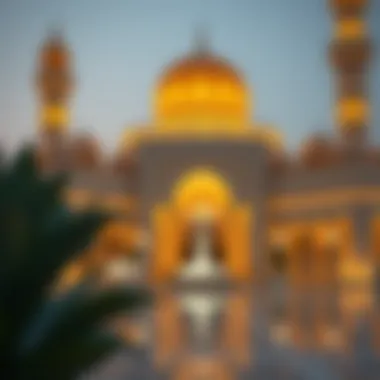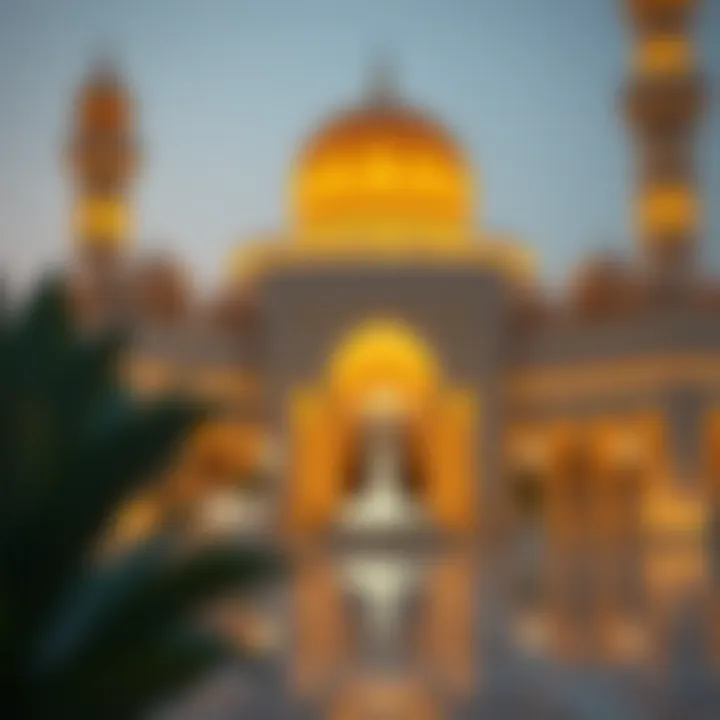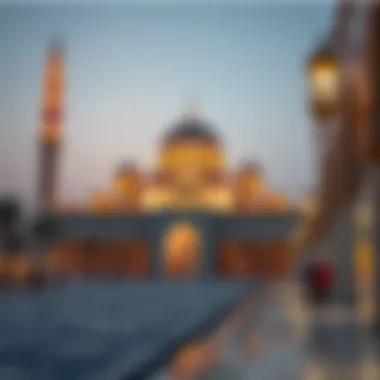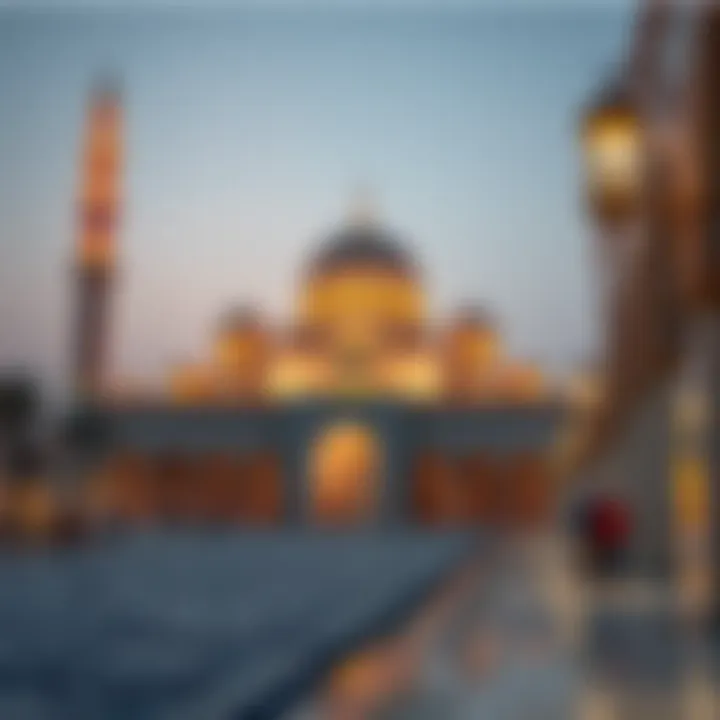Dubai Ramadan Timing: Insights and Impact


Intro
Ramadan in Dubai is more than a mere mark on the calendar; it's a cultural phenomenon that weaves together threads of spirituality, community, and daily life. For many, understanding the timing of Ramadan is essential, as it dictates not only fasting hours but also impacts community activities and even real estate dynamics.
Navigating through this month requires a nuanced grasp of its rhythms. Residents, expatriates, and potential investors must all take note, as the holy month brings forth changes in schedules, practices, and opportunities. This guide delves into these subtleties, aiming to provide a well-rounded perspective on how Dubai pulses and flows during this sacred period. By examining both the communal aspects and investment implications, one can grasp the full significance of Ramadan in shaping life in this vibrant city.
In the sections that follow, we'll explore the intricate tapestry of market trends, investment dynamics, and the cultural importance that Ramadan embodies in the context of Dubai. Let's dive in and awaken your understanding of this unique facet of life in one of the world's most fascinating metropolises.
Preface to Ramadan in Dubai
Ramadan, an incredibly significant period in the Islamic calendar, has a unique resonance in Dubai. This time of fasting, reflection, and community engagement shapes the behaviors and traditions of both locals and expatriates. For anyone navigating the lively city during such a month, grasping the nuances of Ramadan timings isn't just beneficial but essential.
The aspect of timing during Ramadan influences various sectors—from business operations to community gatherings. A clear understanding can be instrumental for investors, expatriates, and even casual visitors trying to immerse themselves in the culture. Knowing when to eat, pray, or participate in social events can greatly enhance one’s experience and highlight the city’s vibrance during this month.
Cultural Context of Ramadan
As the sun sets and the call to prayer echoes, the atmosphere in Dubai transforms dramatically. In a city that thrives on a multicultural tapestry, Ramadan serves as a beautiful binding thread. Though a religious observance, it bears cultural significance that cuts across ethnic divides. For many, it’s a time to reconnect with family and friends, repair strained relationships, and lend a helping hand to those in need.
For expatriates, the cultural landscape during Ramadan provides a rich playground of experiences. One might partake in the age-old tradition of breaking fast—known as Iftar—alongside locals, often in open-air gatherings filled with laughter and communal spirit. Observing these rich practices gives foreigners a glimpse into Islamic culture, fostering respect and understanding.
Religious Significance
For Muslims, Ramadan holds a profound religious significance that carries far beyond just abstaining from food and drink. It’s a period dedicated to spiritual growth, introspection, and enhancing one's relationship with the Divine. Approximately three decades of moving up the ranks from the fifth to the first pillar of Islam, observance during Ramadan is expected of every adult Muslim.
Fasting during Ramadan is not solely physical; it encompasses an array of personal sacrifices that aim to draw one closer to God. It’s about self-restraint, seeking forgiveness, and engaging more fervently in acts of worship. In addition to fasting from dawn until sunset, Muslims are encouraged to read the Qur'an, engage in prayers at night, and extend kindness to others.
Acknowledging the numerous customs and practices associated with Ramadan motions isn't enough; what’s essential is the underlying spirit that defines this sacred month. It is this very essence that brings together communities, helping to strengthen ties that bind residents—both local and expatriate—making Dubai pulsate with an energy and vivacity unlike any other time of the year.
Ramadan is not just about fasting; it’s a discipline that fosters empathy and unity.
Ramadan Timing Basics
Understanding the timing of Ramadan in Dubai is crucial for both locals and expatriates alike. It shapes daily life, influences business operations, and alters social dynamics during this holy month. The meticulous nature of these timings is rooted in religious significance and cultural practices, making it all the more vital to grasp these concepts.
When Ramadan begins, the days are dedicated to fasting from dawn until sunset. This means that each day is marked by specific times when fasting starts and ends, typically dictated by the appearance of the sun.
Knowing Ramadan timings helps residents and visitors navigate daily routines efficiently, making appropriate adjustments to their personal and professional lives. As such, having accurate information on these schedules becomes essential for smooth interactions and activities during this month.
Fasting Hours Explained
Fasting during Ramadan is observed from dawn (Fajr) until sunset (Maghrib), with the precise start and end times varying each day. In Dubai, the Fajr prayer signals the beginning of the fasting period, while the loud calls for the Maghrib prayer mark its end.
As the month progresses, the fasting hours gradually extend, generally ranging from about 13 to 15 hours. It varies slightly depending on the date, as the sun rises earlier and sets later throughout the month. Locals and expatriates often check local mosques or reliable mobile applications for prayer times to stay informed. Additionally, Ramadan calendars are widely distributed, outlining daily fasting hours.
"Understanding the accurate timing of prayers gives the faithful a structured pathway to engage in both spiritual reflection and community activities during Ramadan."
Emphasizing this aspect not only aids in fulfilling one’s religious duties but also contributes to a better grasp of communal activities, like Iftar, where families come together at sunset to break the fast.
Iftar and Suhoor: Key Meals
Two crucial meal times during Ramadan are Iftar and Suhoor.


- Suhoor is the pre-dawn meal consumed before the fast begins. It is typically enjoyed in the early hours, before Fajr, and is essential as it replenishes energy for the day ahead. Many people in Dubai favor hearty meals like oatmeal or fruits, alongside ample hydration to sustain them throughout the long day.
- Iftar, on the other hand, marks the breaking of the fast at sunset. It often features a delightful spread of various dishes. Dates and water are traditionally taken first to break the fast, followed by a variety of local delights like samosas, harira, and fresh juices.
Both meals play a significant role in the cultural celebrations of Ramadan. People make it a point to gather with family and friends during these meal times, fostering a sense of community and togetherness. Many restaurants and hotels embrace this spirit by organizing lavish Iftar buffets to cater to the masses, making it a vibrant social occasion.
Understanding the timing and traditions surrounding Iftar and Suhoor not only respects the customs but also enhances social connections during this unique period.
Ramadan Schedule in Dubai
Understanding the Ramadan schedule in Dubai is critical for residents and expatriates as it shapes the dynamics of daily life during this holy month. The timings serve not just as a guide for fasting but also offer insight into the rhythm of local culture, business operations, and social activities. Many of the city’s activities align closely with the prayer times and nightly gatherings, which are prolific during this period. Having a good grasp of this schedule can enhance one's experience, allowing for better integration into community practices and social norms.
Daily Prayer Times
During Ramadan, prayer times are typically adjusted, and it's vital for both Muslims and those interested in local customs to be aware of these changes. The five daily prayers, which are central to Islamic practice, carry heightened significance during Ramadan, and many congregate in mosques for communal prayers, especially for Tarawih, the special night prayers held after the evening prayer. In Dubai, the prayer schedule shifts due to the longer daylight hours of the summer month.
- Fajr (pre-dawn prayer): Often starts around 4:30 AM.
- Dhuhr (midday prayer): Generally falls around 12:30 PM.
- Asr (afternoon prayer): Usually at about 3 PM.
- Maghrib (afternoon prayer): This is when fast-breaking occurs at around 6:45 PM.
- Isha (night prayer): Typically starts at 8 PM, leading into Tarawih prayers.
It's important to keep updated through apps or local Islamic centers for accurate timings as they can vary slightly from day to day.
Variations by Date
Ramadan doesn't have a fixed ending date and depends on the sighting of the moon, leading to variations in timings throughout the month. This variability requires attentiveness so that one does not miss the immensely communal aspects of the month.
- First Days of Ramadan: The timings can be quite different from the latter days. Typically, as the month moves towards Eid al-Fitr, fasting hours may shorten slightly due to the predicted sighting of the new moon.
- Eid Preparations: The excitement builds as the end of Ramadan approaches, resulting in changes in community celebrations and prayer timings as Eid approaches.
Given these variations, it is prudent to often consult local mosques or community centers for an updated schedule. Staying informed enhances communal ties and invites participation in various events planned for the month.
Take note: Observing the daily prayer times exemplifies the sense of community that Ramadan fosters in Dubai, encouraging interactions and a deeper connection with local traditions.
In summary, navigating the Ramadan schedule in Dubai is not merely about adhering to daily fasting; it's about understanding and embracing the cultural and spiritual significance that guides the lives of many within the city.
Impact of Ramadan on Daily Life
Ramadan is not just a religious observance; it significantly influences various aspects of daily life in Dubai. The holy month, embodying spiritual reflection, community bonding, and self-discipline, brings about a notable shift in routines and societal behaviors. As both residents and visitors navigate this period, understanding these changes is essential for smooth interactions and respectful cohabitation.
Business Hours Adjustments
During Ramadan, business hours see a marked change, adapting to the fasting schedule. Many offices, banks, and shops adjust their opening times, often operating shorter hours to accommodate those observing the fast. Typically, you will find that work hours shrink to around six hours daily, with many businesses choosing to open later in the morning and close earlier in the evening.
For instance, a common schedule might see banks open from 9:00 AM to 2:00 PM, while retail shops may open until the Iftar meal, creating a dynamic environment where the bulk of shopping and business transactions take place in the late afternoon or early evening. Understanding these hours is crucial for expatriates trying to conduct business or interact with local companies during this month. It’s wise to adjust one’s schedules accordingly, keeping in mind that many employees may be more fatigued due to fasting.
Social Gatherings and Community Events
Social interactions take on a different essence during Ramadan. Iftar gatherings, where individuals break their fast together, become the highlight of the day. It's not unusual for friends, families, and communities to come together for large meals, fostering unity and goodwill. Many employers even host iftar events for employees, which not only serve the purpose of breaking bread together but also strengthen workplace relationships.
Community events flourish during this time, with mosques and cultural centers hosting special activities ranging from Quran readings to charitable initiatives. Such events are vital as they promote community spirit, allow for cultural exchanges, and enrich the overall experience of expatriates.
"The spirit of togetherness during Ramadan can really enhance your sense of belonging, whether you’re a local or just passing through."
Cultural Practices During Ramadan
Ramadan is steeped in cultural practices that both locals and expatriates are encouraged to respect. While Dubai is known for its cosmopolitan nature, observing the customs during this month is viewed as a sign of respect and understanding towards Muslim practices.


Common cultural practices include:
- Charity: Known as Zakat, many individuals increase their charitable contributions during Ramadan. Participating in local charity drives or volunteering is a cherished way to give back to the community.
- Increased prayer and reflection: Many individuals engage more deeply in their spiritual practices, attending nightly Taraweeh prayers, which may alter scheduling for those looking to socialize or meet.
- Traditional meals: The breaks in fasting (Iftar and Suhoor) often involve consuming traditional foods, reflecting the rich culinary heritage of the region. It’s common to see special menus in restaurants, highlighting Ramadan delicacies.
During Ramadan, a deeper respect towards the community’s values will enrich the experience of all who are in Dubai. Recognizing and adapting to these cultural nuances will ultimately foster good relationships and a more profound understanding of the local lifestyle.
Dining Etiquette During Ramadan
Dining etiquette during Ramadan holds significant importance for both locals and expatriates living in Dubai. It serves as a bridge between cultural respect and personal enjoyment, allowing those from diverse backgrounds to come together in harmony. Understanding the delicate balance of dining etiquette during this month fosters an appreciation for the rich traditions and customs of Ramadan, while encouraging respectful interactions.
Restaurants and Iftar Buffets
During Ramadan, culinary establishments in Dubai prepare elaborate Iftar buffets catering not only to the needs of fasting individuals, but also to those who wish to partake in the festive spirit. Iftar, breaking the fast at sunset, is an essential part of the day's rituals, marked by delicious meals that often include date fruits and refreshing beverages. Restaurants like Al Fanar and Asha's offer special menus that highlight local and international dishes.
What to Expect:
- Diverse Menus: You will find an array of options from traditional Emirati dishes such as harees and majboos to international cuisines reflecting the city's global character.
- Reservations Recommended: Make bookings in advance to secure your spot, as restaurants tend to fill quickly during this period.
- Buffet Etiquette: Remember to wait for the call to prayer before starting your meal. This shows respect for the Ramadan traditions.
A key aspect of dining at Iftar buffets involves being mindful of the environment. Many places take care to create a family-friendly atmosphere, incorporating homely touches to make the meal more special. You may also find themed events that showcase the culinary talents of local chefs.
Respecting Local Norms
Respecting local customs during Ramadan is not just polite; it symbolizes an embrace of the culture that shapes daily life in Dubai. As traditions intertwine with the rhythm of the city, acknowledging these norms enriches your experience while promoting fellowship and respect among communities.
Key Considerations:
- Fasting Awareness: It's important to refrain from eating, drinking, or smoking in public spaces during daylight hours, as this might offend those who are observing the fast.
- Dress Code: In public, modest attire is preferred. This aligns with the values of humility and decency celebrated during Ramadan.
- Thoughtful Communication: When discussing Ramadan, be sensitive; avoid misunderstandings or comments that may seem trivializing to those observing the fast.
“Ramadan is a month that binds us through respect and understanding. Demonstrating awareness simply enhances our shared experiences.”
Adopting these considerations not only reflects a deep-seated respect for local traditions but also establishes a positive rapport with the community. It allows expatriates and locals to navigate social situations during this holy month gracefully.
In summary, navigating dining etiquette during Ramadan in Dubai seamlessly marries respect with celebration. By recognizing the essence of Iftar and engaging with local customs, everyone can partake in this unique cultural experience—one that stands as a testament to Dubai's rich heritage and the bonds shared among its residents.
Ramadan and Real Estate Market Trends
The intersection of Ramadan and the real estate market in Dubai presents unique trends and opportunities that anyone involved in or observing this sector must understand. Throughout this holy month, fluctuations in demand and shifts in investment strategies can heavily influence the real estate landscape. As people fast and engage in spiritual practices, the way they approach housing and property investment can change dramatically.
Seasonal Demand Fluctuations
During Ramadan, there’s often a noticeable ebb and flow in real estate transactions. Typically, the fasting month sees a slowdown in the market as many potential buyers and renters focus on the spiritual aspects of the month and family gatherings, rather than on property viewings or negotiations. However, just as the crescent moon signals the start of this month, it can also bring about spikes in interest towards the end of Ramadan, particularly as families prepare for Eid celebrations.
- Reduced Viewing Activities: It's customary for people to become more introspective during Ramadan. This shift means that fewer property viewings occur. Many potential buyers and renters delay their plans until after the holy month, preferring to dedicate their energies to fasting and prayer.
- Eid Surge: As Ramadan comes to an end, the excitement surrounding Eid leads families to review their living situations. Increased interest during this period can push buyers back into the market, seeking properties that accommodate larger gatherings for celebrations.
- Pricing Adjustments: Property owners might lower asking prices during Ramadan to attract those who are ready to strike deals leading into Eid, creating a window of opportunity for buyers to snag a good deal.
Investment Opportunities
Amid the quiet tones of Ramadan, astute investors can find rich opportunities waiting to be capitalized on. These prospects often emerge not just in the short term but have implications for long-term gains as well.
- Focus on Family-Oriented Developments: Investors might consider targeting family-friendly properties during this time. Developments that cater to larger families looking to host celebrations become more attractive as demand can surge post-Ramadan.
- Tourism and Short-Term Rentals: With many expatriates and tourists visiting Dubai during this season, especially for Eid, properties suited for short-term rentals can see an uptick in interest. Targeting areas near popular attractions or mosques could yield significant returns.
- Long-Term Strategy: Though immediate trading might lessen, this pause can be a great time to assess properties and neighborhoods that are expected to grow. Investors conducting thorough market analyses during Ramadan can make informed decisions regarding future purchases.
Understanding the unique rhythm of Ramadan can help agents and investors navigate the market with greater insight. Eagerly waiting for the month to pass can be a missed opportunity if one knows where to look.


Overall, being aware of the nuances associated with Ramadan provides a foothold for anyone looking to engage with Dubai's real estate market. Adjusting strategies and recognizing both the challenges and opportunities present during this time can result in sound investments and significant successes.
The Role of Expatriates During Ramadan
The expat community in Dubai is quite vibrant, bringing together individuals from various corners of the globe. Their role during Ramadan is multifaceted, intertwining cultural exchanges and community cohesion. Understanding how expatriates interact with Ramadan customs not only reflects the spirit of the city but also highlights the importance of unity amidst diversity.
Integration into Local Culture
Integration during Ramadan presents a unique opportunity for expatriates to engage with the local traditions and practices. Many expats choose to participate in Iftar gatherings, where they share meals with Emirati families. This act fosters a sense of connection, bridging cultural divides and promoting goodwill.
Considerations for Expatriates:
- Participating in Traditions: Joining local families for Iftar or Suhoor can be enriching. It’s a chance to savor traditional dishes like harees and dates, while engaging in conversations that offer insights into cultural contexts.
- Learning Arabic Phrases: Simple greetings or expressions related to Ramadan can show respect and willingness to be part of the local culture, making interactions more meaningful.
- Community Activities: Engaging in volunteer opportunities, such as food drives during Ramadan, demonstrates solidarity and enhances the sense of community.
Through these efforts, expatriates not only enhance their own experiences but also contribute positively to community dynamics, crafting a more inclusive environment.
Challenges and Adaptations
While engaging with local culture can be fulfilling, it’s not without its hurdles. The fasting requirements of Ramadan can create challenges for expatriates who may not be familiar with the customs or who come from different backgrounds.
Common Challenges:
- Adjusting Daily Routines: Expatriates often find the shifts in work hours and social activities perplexing. Business hours change, with many companies adjusting to accommodate prayer times and fasting schedules. This can affect productivity and also lead to misunderstanding among international colleagues who may not be accustomed to these practices.
- Navigating Fasting Expectations: For some expatriates, the observance of fasting might be entirely new. Those who are not Muslim may feel pressure to adapt, which can result in discomfort or confusion. For instance, being discreet about eating or drinking in public can require major lifestyle adjustments.
- Social Inclusion: While many locals are welcoming, expatriates might face challenges regarding social integration, especially in settings where strict adherence to Ramadan customs is expected.
Adaptation Strategies:
- Educating Oneself: Seeking insights through local resources, community groups, or even formal classes can promote understanding and ease anxieties related to Ramadan practices.
- Creating a Flexible Mindset: Embracing change and being open to new experiences can facilitate smoother transitions during this holy month.
"Ramadan is a moment where time slows down, allowing for deep connections and an appreciation for simple joys. Engaging positively can make expatriates part of this beautiful tapestry of cultures and practices in Dubai."
Closure: Reflecting on Ramadan in Dubai
Ramadan in Dubai is more than just a month of fasting; it emphasizes the city's rich cultural fabric. Each year, the holy month brings a wave of unity among both locals and expats, deepening their understanding of shared values. By shedding light on how this cultural celebration drives community spirit, this article underscores the significance of knowing the local customs, timings, and the general atmosphere during Ramadan.
Understanding Ramadan timings aids not only those observing the fast but also expats seeking to navigate their daily lives respectfully. Adapting to changing business hours and being aware of meal timings becomes essential. For expatriates, aligning schedules with local customs fosters respect and integration into the local culture.
Significance for Locals and Expats
The holy month serves as a reminder of community values, charity, and spiritual growth for locals. For expatriates, it provides a unique opportunity to engage with Emirati traditions. By participating in communal iftar meals or attending cultural events, expats can build relationships and networks that might not exist otherwise. The camaraderie found during Ramadan fosters an inclusive environment, bridging the gap between different cultures.
Locals often open their homes to friends and colleagues for breaking fast. The sharing of meals becomes a symbolic gesture of hospitality, showcasing the warmth that defines Emirati culture.
Ultimately, the significance of Ramadan transcends individual practices, fostering a sense of belonging for everyone in Dubai. Such experiences are transformative, blending different cultural backgrounds into something beautiful.
Looking Ahead: The Future of Ramadan Traditions
As the world evolves, so do traditions. Ramadan in Dubai is poised to remain a vibrant aspect of the city’s identity, but its celebration will likely continue adapting to modern influences. Technological advancements, such as apps to track prayer times or meal options, are resulting in a fusion of tradition with contemporary convenience.
Moreover, with Dubai positioning itself as a global city, Ramadan will incorporate a more cosmopolitan flavor. Expatriates may find that they can blend their own customs with local ones, creating a richer tapestry of celebration. Local authorities may also invest more in cultural awareness programs that promote understanding across communities, fostering collaboration among residents.
In the decades to come, Ramadan hopes to strengthen bonds amongst diverse cultures. It is not just about fasting or prayer hours; it embodies a spirit of generosity, understanding, and respect that can echo throughout the year. The future of Ramadan traditions holds the promise of unity, enhancing the city's cosmopolitan spirit even further.
"Dubai's Ramadan traditions offer both locals and expats spaces to come together in shared experiences, reminding us of the bonds we can create."
To further enrich the understanding of Ramadan's context within Dubai, interested parties can refer to the Federal Authority for Government Human Resources for guidelines on public sector timings or visit Visit Dubai for details on events associated with Ramadan.
Embracing the spirit of Ramadan while staying attuned to its practices will ensure that both locals and expats foster deeper connections, facilitating a greater appreciation of the rich traditions that define this holy month.



